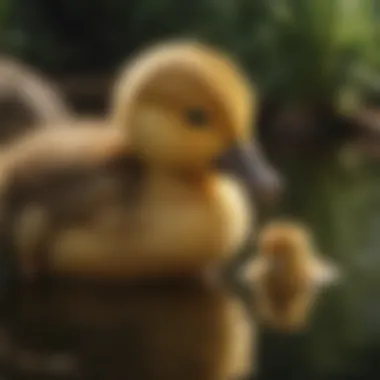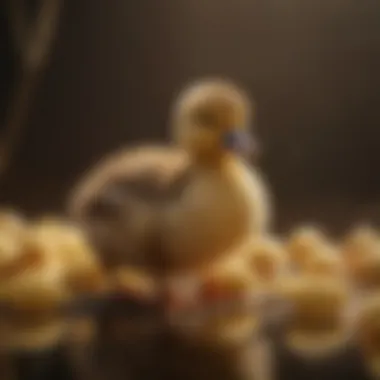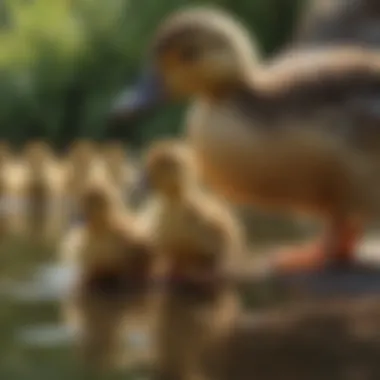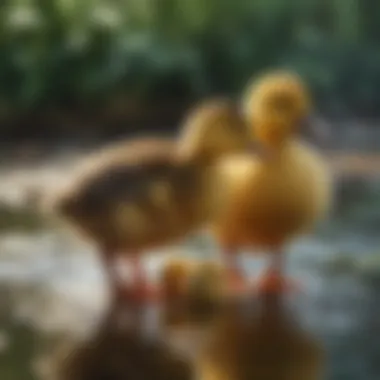Best Feed for Ducklings: Essential Nutritional Guide


Intro
Understanding the dietary needs of ducklings is crucial for their healthy development. Nourishment plays a central role in ensuring they thrive during their early stages of life. In this comprehensive guide, we will explore the best feed options for ducklings and detail the essential nutritional components that promote growth.
Ducklings have specific needs that must be addressed to support their health and overall well-being. As small waterfowl, their diets differ from those of chicks or other poultry. It is vital to recognize their unique requirements, dispel common myths surrounding duckling nutrition, and learn effective feeding strategies.
This article aims to empower duck owners with knowledge about their young ducks’ feeding habits. The spotlight will be on various commercial feed options available, the advantages and disadvantages of each, and tailored dietary practices. Our goal is to ensure that every duckling flourishes into a healthy adult.
Nutrition and Diet Tips
Understanding Dietary Needs
Ducklings require a well-balanced diet rich in essential nutrients. Their primary nutritional components include proteins, fats, vitamins, and minerals. Protein is particularly important for growth.
Best Feed Options
- Starter Feed: This feed is specially formulated for ducklings and contains higher protein levels, around 20-24%. It supports muscle development and feather growth.
- Non-Medicated Feed: Non-medicated options avoid antibiotics, which can benefit the birds' health by promoting natural immunity.
- Whole Grains: Supplementing with whole grains provides additional nutrients and encourages natural foraging behavior.
Feeding Frequency
Ensure ducklings have access to food several times a day. They have small stomachs and require frequent meals to meet their energy needs. Offering three to four meals daily can support optimal nutrient absorption.
Common Health Issues and Solutions
Ducklings may encounter health concerns related to diet, such as malnutrition or growth deficiencies. It's vital to monitor their condition regularly. Some common issues and their solutions include:
- Pasting: This condition causes a buildup around the duckling's vent. Ensuring proper hydration and a balanced diet can help prevent it.
- Splay Leg: Poor nutrition can contribute to this issue. A diet rich in vitamins and minerals is necessary for musculoskeletal health.
Importance of Regular Check-Ups
Regular visits to a veterinarian can help catch any potential health issues early. A professional can guide dietary adjustments based on specific needs, ensuring that your ducklings maintain optimal health.
Epilogue
Proper nutrition is a fundamental aspect of raising healthy ducklings. By understanding their dietary needs, exploring the best feed options, and addressing common health concerns, duck owners can support the growth and well-being of their flock. This guide serves as a reliable reference for cultivating a nourishing environment for your ducklings, maximizing their chance for a full, healthy life.
Prelims to Duckling Nutrition
Understanding duckling nutrition is fundamental for any individual or entity responsible for raising these young birds. To foster healthy growth, it is crucial to comprehend their specific dietary needs and the type of feed that meets these requirements. Feeding ducklings properly can impact their overall health, growth rate, and well-being in profound ways.
Importance of Proper Feeding
Proper feeding of ducklings is not just a matter of providing food; it's about offering a balanced diet that supports their rapid growth and development. During their first weeks of life, ducklings experience significant physical changes. They require a diet rich in nutrients to sustain their energy levels and promote proper organ development.
Poor nutrition can lead to a variety of health issues, such as stunted growth or weakened immune systems. Ducklings are particularly sensitive to dietary deficits, which may affect their long-term health, making it essential for caregivers to prioritize their feeding regimen.
In addition to health implications, proper feeding can significantly affect the quality of meat and eggs in ducks raised for production. Nutritional deficiencies can impact not only the health of the bird but also the quality of the products they provide.
Overview of Duckling Dietary Requirements
Ducklings require a well-rounded diet to thrive. Their dietary requirements include proteins, fats, carbohydrates, vitamins, and minerals, each serving a unique function in their development.
- Proteins are vital for growth and development, aiding in muscle formation and overall body structure.
- Fats provide a concentrated source of energy essential for active growth periods.
- Carbohydrates serve as the primary energy source, supporting daily activities and growth.
- Vitamins and minerals are critical in various physiological functions such as bone formation and immune response.
It's important to understand that these nutrients should be balanced. Overemphasis on one element can lead to deficiencies in another, resulting in health issues like leg problems or poor feather development.
As caregivers, recognizing and meeting these dietary requirements can ensure healthy growth and a robust immune system in ducklings. The importance cannot be overstated; careful attention to nutrition sets a strong foundation for the future of these animals.
Nutritional Components of Duckling Feed


Ducklings require a well-balanced diet to ensure healthy growth and development. Understanding nutritional components is key to choosing the right feed. This section examines the essential elements, their benefits, and considerations to ensure ducklings receive adequate nutrition for optimal health. A proper diet will not only enhance growth but also improve overall well-being.
Proteins
Proteins serve as the building blocks for growth and development in ducklings. They are crucial for muscle development, feather formation, and overall tissue repair. Ducklings require a rich source of protein, especially during the initial weeks of life. High-quality protein sources include soybean meal, fish meal, and certain grains.
- Importance of Protein: A diet rich in protein helps in building muscle mass and supports immune function. This is crucial for young ducklings as they are more vulnerable to illnesses.
- Protein Levels: Generally, young ducklings need a protein content ranging between 18% to 20%. As they mature, the protein requirement can decrease.
Overfeeding protein may lead to growth issues or health problems. It's essential to strike a balance to ensure ducklings receive the appropriate amount. Regular assessments of their growth and health can help in adjusting their protein intake as needed.
Vitamins and Minerals
Vitamins and minerals play a pivotal role in the overall health of ducklings. They aid in various bodily functions and play a significant role in metabolic processes. Deficiencies in essential vitamins and minerals can lead to severe health issues and developmental delays.
Key vitamins and minerals include:
- Vitamin A: Important for vision and immune function.
- Vitamin D: Aids calcium absorption, which is vital for bone development.
- Calcium: Strengthens bones and helps in feather production.
- Phosphorus: Works in conjunction with calcium for proper bone health.
Ensuring a balanced intake of vitamins and minerals can be achieved through high-quality feed. Some commercial feeds are fortified with essential vitamins, but always check the labels for nutrient content to avoid deficiencies.
Fats and Carbohydrates
Fats and carbohydrates provide necessary energy for ducklings. They are essential for maintaining a healthy metabolism and supporting daily activities. While carbohydrates serve as a primary energy source, fats are crucial for energy density.
- Fats: Providing a high-energy source, fats are necessary for weight gain and overall energy. Emphasis should be placed on unsaturated fats, such as those found in fish oil or vegetable oils, for better health outcomes.
- Carbohydrates: Commonly derived from grains like corn, oats, or barley, carbohydrates should make up a significant portion of the diet. They support rapid energy release, which keeps the ducklings active.
As a general guideline, about 4% to 6% fat and a moderate amount of carbohydrates should be included in the feed. Monitoring the energy levels of ducklings can help to adjust fat and carbohydrate mixes in their diet accordingly.
In summary, a balanced diet rich in proteins, vitamins, minerals, fats, and carbohydrates is vital for the healthy growth of ducklings. Proper attention to these nutritional components will enhance their development and well-being.
Types of Duckling Feed Available
When it comes to feeding ducklings, understanding the different types of feed available is crucial. Choosing the right feed directly impacts the health and growth of these young birds. Each type of feed has its pros and cons, depending on availability, cost, and specific dietary needs. This section will explore three primary categories: commercial duckling feed, homemade options, and organic alternatives, ensuring you have well-rounded choices for optimal duckling nutrition.
Commercial Duckling Feed
Commercial duckling feed is one of the most common choices for duck owners. It is specifically formulated to meet the nutritional needs of ducklings at different growth stages. These feeds often contain a balanced mix of proteins, vitamins, and minerals to support rapid growth. When selecting commercial feed, it is essential to check for adequate protein content, generally around 20-24%, especially for growing ducklings.
- Benefits:
- Convenience of use.
- Formulated by nutrition experts.
- Consistent quality and nutrient profile.
However, there are considerations to keep in mind. The ingredient list varies among brands, and some feed may contain fillers or artificial additives. Reading labels is important. Many reputable brands focus on high-quality ingredients, so prioritize those for the health of your ducklings.
Homemade Feed Options
For those interested in crafting their own duckling feed, homemade options can be both beneficial and economical. You have the control to select ingredients that meet your ducklings’ needs without unnecessary additives. Common ingredients for homemade feed include grains like corn, oats, and wheat, along with protein sources like soybeans, peas, and fish meal. Adding vegetables can also enhance the nutrient variety.
- Benefits:
- Customizable to suit specific dietary requirements.
- Often more cost-effective.
- Fresh and potentially chemical-free ingredients.
However, care is needed to ensure that homemade mixtures provide complete nutrition. Balancing protein, vitamins, and minerals is vital. Sometimes, consult a nutritionist or veterinarian to create a well-rounded feed plan.
Organic Feed Alternatives
Organic feed has gained popularity among conscientious duck owners. These feeds use ingredients grown without synthetic pesticides or fertilizers. The advantages include the peace of mind that comes from feeding your ducklings organic products. This type of feed often includes all-natural ingredients, focusing on sustainable farming practices.
- Benefits:


- Healthier and more sustainable for the environment.
- Reduced risk of chemical exposure for both ducklings and consumers.
Yet, it is typically more expensive than conventional feed. Some might find access limited depending on location. As demand grows, more brands are emerging with organic options. Comparing the ingredient list and nutritional content remains essential.
Analyzing Commercial Duck Feed Brands
Understanding the various commercial duck feed brands is crucial for any duck owner. Each brand comes with its own formulation, tailored to cater the nutritional needs of ducklings at different growth stages. Choosing the right brand can directly impact the health, growth, and overall well-being of your ducks. This section aims to unravel key considerations in analyzing commercial feed.
Top Brands Reviewed
When selecting commercial duck feed, some notable brands are frequently recommended by experts and experienced duck owners. Purina is highly regarded for its all-in-one formula that combines necessary proteins and vitamins essential for duckling growth. Manna Pro offers a well-balanced option, known for its good mix of grit and nutrients. Another brand, Dumor, is favored for its affordability while still containing necessary dietary elements. Each of these brands has its strengths, but it is essential to read customer reviews and consult with veterinarians to determine the best fit for your ducklings’ specific needs.
Ingredients to Look For
While a brand may seem popular, it is the ingredients that define a good duck feed. When analyzing commercial duck feed, consider the following key components:
- Proteins: Look for feeds containing high-quality protein sources like soybean meal or fish meal. These are crucial for muscle development and overall growth.
- Vitamins and Minerals: Check for essential vitamins such as A, D3, and E, along with minerals like calcium and phosphorus to support bone health and reproductive wellness.
- Fats: Essential fatty acids promote healthy skin and feather development. Sources like flaxseed or fish oil are often included in premium feeds.
- Carbohydrates: These provide the energy that ducklings need for growth and activity.
Make sure to read the ingredient label carefully. Quality components ensure better growth and health for your ducklings.
By paying attention to these details, duck owners can make informed decisions, providing optimal nutrition for their young birds.
Feeding Ducklings: Best Practices
Feeding ducklings using best practices is vital for their growth and health. Ducklings have specific nutritional needs during the early stages of life. If not met, this can lead to serious health issues. Therefore, focusing on the right methods boosts their development and overall well-being.
Age-Specific Feeding Guidelines
Age is a critical factor when it comes to feeding ducklings. Each stage of development requires specific dietary components.
- Newly Hatched (0-1 Week): Ducklings need starter feed that is high in protein, usually around 20-22%. They should have access to clean water at all times.
- 1-3 Weeks: At this stage, you can slowly introduce grower feed with around 18% protein. Offer nutrients that support bone and feather growth.
- 3-6 Weeks: Ducklings become more active. It’s time to transition to a lower protein duck grower feed, typically around 16%. Nutritional balance is still very important.
- 6 Weeks and Older: Now switch to a maintenance feed that has lower protein content, around 14% to support adult growth.
Understanding these stages helps in optimizing their health.
Frequency of Feeding
Feeding frequency plays a significant role in the health of ducklings. Generally, ducklings should be fed multiple small meals throughout the day.
- First Week: Feed at least 3 to 4 times a day. Small portions help prevent wastage and keep them energized.
- Weeks 2-3: Two to three times a day is often sufficient. Monitor how much they are eating; adjust according to their needs.
- From Week 4 Onwards: You may reduce feeding to twice a day as they mature.
Consistency is key; this helps them adapt better.
How Much to Feed
Determining the correct amount of feed is essential. Ducklings are prone to overfeeding if not monitored well.
- Observation: Watching their feeding habits is important. Typically, ducklings will eat about 5% of their body weight in feed per day.
- Bowl Size: The size of the feeding bowl should be appropriate. Too large can lead to messiness and spoilage.
- Adjustments: Always adjust the feed quantity as they grow. Ensuring they are neither hungry nor overfed is crucial for metabolic health.
In summary, following these best practices can greatly enhance the growth and development of ducklings, ensuring they thrive in a healthy environment.
Common Feeding Mistakes to Avoid
Feeding ducklings sounds simple, but many new duck owners make common mistakes that can affect the health and growth of their young birds. Avoiding these pitfalls is crucial for ensuring that ducklings receive the best start possible in life. Awareness of these feeding mistakes allows for better management of their diet, leading to robust health and vitality. It is not just about what feed to choose; it is also about how one implements feeding practices.
Overfeeding Concerns
One of the most prevalent issues faced by duck owners is overfeeding. Ducklings, like any young animal, require a careful balance in their diet. When fed too much, ducklings can suffer from obesity, which can lead to a variety of health issues, including joint problems and heart complications. A common misconception is that providing an abundance of food will lead to quicker growth. In reality, gradual and steady growth is healthier for ducklings. Feeding them small portions several times a day encourages proper digestion and helps avoid stress on their developing systems.
Some warning signs of overfeeding include lethargy, refusal to move, and visible fat accumulation. Monitoring their behavior and size is integral for maintaining their health. Proper feeding guidelines should be adhered to, ensuring the amounts are appropriate for their age and weight.


Neglecting Nutritional Balance
Another frequent error among duck owners is neglecting the nutritional balance in duckling diets. It is vital that the feed provided contains the appropriate mix of proteins, fats, vitamins, and minerals. A feed that lacks these essential nutrients can lead to deficiencies that manifest in various ways.
Ducklings need higher protein content in their diet during the early growth stages. A formula that is inadequate in this regard can inhibit their growth. Similarly, vitamins such as A, D, and E, along with key minerals like calcium and phosphorus, are often overlooked but are critical for bone development and overall health.
To ensure a balanced diet, owners should carefully read the labels on commercial feeds or measure ingredients when preparing homemade options. Understanding what nutrients are necessary at different growth stages helps in crafting a diet that meets the specific needs of ducklings.
Supplementing Duckling Diets
Supplementing a duckling's diet can be essential for their overall health and growth. While commercial feeds often meet basic nutritional requirements, there are situations where adding supplements can make a significant difference. Supplements can provide additional vitamins, minerals, and other nutrients that might be lacking in the primary diet. This section will explore the benefits of natural and commercial supplements.
Natural Supplements
Natural supplements can be a great way to enhance a duckling's diet. These are often derived from whole foods and tend to be more appealing to ducks. Some beneficial natural supplements include:
- Leafy greens like spinach, kale, and chard provide essential vitamins and minerals.
- Herbs such as parsley and cilantro can support digestion and provide additional nutrients.
- Grains like oats and barley can be offered in small quantities for extra energy.
- Seeds, including flaxseeds and sunflower seeds, can contribute healthy fats to the diet.
When introducing natural supplements, it is crucial to do so gradually. Ducks can have sensitive digestive systems, and too many new foods can cause gastrointestinal upset. Also, ensure that any greens or herbs added are pesticide-free, as chemicals can be harmful to ducklings. The freshness of these supplements matters. Always choose fresh, clean items for the best health benefits.
Commercial Supplements
Commercial supplements are another option for duck owners looking to enhance their ducklings’ nutrition. They are usually formulated to fill nutritional gaps and can be easier to obtain than sourcing natural options. Here are some common commercial supplements available:
- Vitamin and mineral powders designed specifically for ducks; these can be mixed into their feed.
- Probiotics that promote gut health and improve digestion.
- Specialized growth formulas that may include extra protein or fat to support rapid growth phases.
While commercial supplements can be beneficial, selecting high-quality products is vital. Not all supplements are created equal, and some may include fillers or additives not suitable for ducklings. Always read labels carefully and select products from reputable brands. User reviews can also offer insights into the effectiveness of these products.
Signs of Nutritional Deficiencies in Ducklings
Understanding the signs of nutritional deficiencies in ducklings is crucial for their growth and health. Nutritional deficiencies can lead to serious health problems and even affect the overall vitality of ducklings. Recognizing these early can make a huge difference. Providing balanced nutrition helps prevent many issues that can arise from improper feeding. Knowing what to look for can ensure that your ducklings are getting the care they need.
Recognizing Symptoms
Symptoms of nutritional deficiencies in ducklings can manifest in various ways. Some common signs include:
- Poor Growth Rates: Ducklings may show stunted growth if they are lacking essential nutrients.
- Abnormal Feather Development: Inadequate nutrition can lead to irregular feather growth or feather loss.
- Behavioral Changes: Ducklings may become lethargic or less active if they are not receiving proper nutrition.
- Weakness: A general weakness and difficulty in movement can indicate nutritional issues.
- Changes in Feces: Abnormal fecal consistency or color may indicate a dietary imbalance.
Attention to these indicators is vital. Early detection can help prevent further complications.
Taking Corrective Action
Once deficiencies have been identified, quick action is necessary to correct the issues. Here are some recommendations to consider:
- Consult a Veterinarian: It is always best to seek professional advice when nutritional deficiencies are suspected.
- Revise Feeding Plan: Based on symptoms, re-evaluate the current diet. Incorporate feed that meets nutritional requirements.
- Use Supplements: Adding specific vitamins or minerals can help restore balance to the diet. Commercial supplements can be effective.
- Create a Balanced Diet: Ensure that the feed contains the required proteins, fats, vitamins, and minerals.
- Monitor Progress: Observe the ducklings after changes have been made. Look for improvements in health and activity levels.
Taking these steps can lead to a significant improvement in the overall health of ducklings. Be proactive in nutrition management to sustain their growth and vitality.
Culmination: Making Informed Decisions on Duckling Feed
Making informed decisions about duckling feed can have a profound impact on their growth and overall health. The decisions you make regarding their diet can influence their vitality, resistance to disease, and long-term well-being. Understanding the nutritional requirements of ducklings is also crucial. It's not just about providing feed; it’s about providing the right feed that meets all their dietary needs.
When evaluating feed options, consider the nutritional content, ingredients, and the reputation of the feed brands. Comparing commercial feeds with homemade options can help you figure out what fits your specific situation. Each option has its pros and cons, and weighing these factors ensures your ducklings receive a balanced diet.
"Proper nutrition sets the stage for healthy development in ducklings, impacting their growth, behavior, and longevity."
Evaluating Feed Options
Evaluating feed options involves examining various factors such as ingredients, cost, accessibility, and specific nutritional content. Look for feed that contains adequate proteins, vitamins, and essential minerals. Ingredients such as corn, soybean meal, and fish meal are common in many commercial feeds, providing essential nutrition.
- Look for high-quality protein sources: Proteins are fundamental for growth. Ensure the feed contains 18-20% protein for optimal development.
- Check for vitamins and minerals: Nutrients like calcium and phosphorus are vital for bone development.
- Cost versus quality: While cheaper options exist, they may compromise on the nutritional value. It’s often wise to invest in higher-quality feed for better long-term outcomes.
Long-term Feeding Strategies
Long-term feeding strategies should focus on adaptability and balance. As ducklings grow, their dietary needs will change. It’s crucial to adjust their feed as they transition from chick starter to grower and then to maintenance feeds.
- Monitor growth: Regularly check the growth rates of your ducklings. Adjust the feed type or amount accordingly if growth is not what you expect.
- Consider seasonal changes: In winter, ducklings may require additional calories to maintain body heat. Plan accordingly.
- Consult with experts: Reaching out to a veterinarian or a poultry nutritionist can provide tailored advice based on your specific situation.







